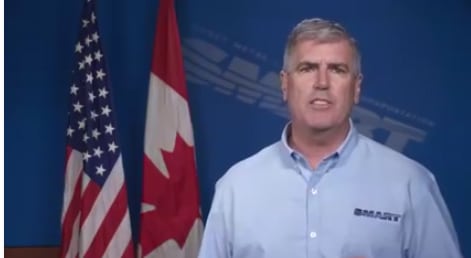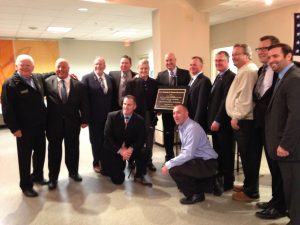 Robert “Bobby” Bonds passed from this life October 29, 2015 at the age of 61. Bobby is survived by his wife, Ronna, and four (4) children, Max, Madalyn, Danielle and Andrew, his mother Marie and brother Richard.
Robert “Bobby” Bonds passed from this life October 29, 2015 at the age of 61. Bobby is survived by his wife, Ronna, and four (4) children, Max, Madalyn, Danielle and Andrew, his mother Marie and brother Richard.
Bobby was employed by Amtrak for nearly 4 decades. Most of his long career was spent as the Director of Operation Redblock, where he committed himself to a life of service to his fellow union members and keeping our brothers and sisters in Labor strong.
Bobby committed his life to helping others, often when they were at the lowest moments of their lives. Most of us are happy if we change or improve one life. Bobby changed the world for the better and improved the lives of all who knew him. But Bobby didn’t stop there, while he was busy giving compassion and guidance, he also challenged us to do more, be better and reach higher. When you talked to Bobby, you knew that you were the focus of all his attention and in that moment nothing was more important.
But Bobby also knew that none of his efforts would have been possible if not for his loving family, who sacrificed so much when they allowed him to be the generous man that he was. We share in their grief, and offer them our thoughts and prayers.
In remembrance and honor of Bobby’s contribution to so many, we take this opportunity to paraphrase what many have to say about him:
To have known Bobby is to know that his outlook on life was truly positive, and never without possibilities. He truly believed that it is possible to manage our way through all our challenges, no matter how difficult they may seem.
Bobby was a strong and loyal advocate to the most vulnerable and disenfranchised among us… He has given strong meaning to real compassion and leadership…
He truly believed in the concept of peer involvement to prevent employee use of alcohol and/or drugs while on duty or subject to call. Bobby also challenged and educated everyone he met to aspire to that same concept.
Bobby was a man of character. His word was his bond, which he never broke. He was a model of ability and competency.
He was determined, dedicated, compassionate, tireless, a consistent and credible leader, and above all else, a trustworthy friend.
Bobby possessed integrity and a sincerity that was unyielding and infectious.
He was a decisive, analytical, change-agent, tenacious, caring, considerate, and most importantly, someone with a huge heart. His style of transformational leadership will serve to engage, challenge and inspire the community.
Bobby’s ability of bringing people together even in the most adversarial conditions is unprecedented. He was a man of principle, and commitment.
It was a gift to have met, known and worked with Bobby, but we should not forget the richest gift he gave us is his message of hope and perseverance, and that we are sustained when we step in and help each other whenever there is a need. Throughout his life, Bobby saved and changed 10,000 other lives. Those people touched and inspired by Bobby then went on to help others. In using that math, we can confidently tell you that Bobby changed and saved millions of lives, and that story continues through us…
Robert Keeley
SMART TD
General Chairman, Yardmasters
Author: paul

Events will take place at locations featuring most of the trades, including sheet metal locals in Los Angeles, Cleveland and Boston. The National Building Trades has also produced a new video, highlighting these open house events which is available via this YouTube link.
These events, suring the week of November 2-8 are scheduled to coincide with inaugural National Apprenticeship Week, designated by the U.S. Department of Labor and President Barack Obama. The week is intended for employers, students and economic development leaders to learn about and promote the opportunities available through apprenticeship programs in the United States. It is modeled after a similar program initiated in Great Britain.

“Technology actually can help,” Obama said, “in the same ways that in the past sometimes it’s hindered.” The president made specific mention of CoWorker.org which enables workers to start petitions and campaigns around workplace issues. Other online platforms mentioned include Wearedynamo.org, a crowd-sourced website for workplace complaints and Contratados.org, a Spanish-language platform that allows migrant workers to rate their experiences with recruiters and employers.
The decline in union density is one factor that is driving growth in this new form of app technology another is the effect of new workplace dynamics in which employers substitute subcontracting and franchising in place of direct employment.
Label it, Scan it, Report it.
The new union label is here.
Find out more at LabelItScanItReportIt.com
Click the image below to view the video.

The proposal from Rep. Tom Brinkman (R-Mount Lookout) would prohibit mandatory union membership at workplaces. The change would give employees the choice to opt out of unions and their dues. Twenty-five states have right-to-work laws, including recently passed proposals in Wisconsin, Michigan and Indiana.
Read more from Telegraph-Forum.
Reprinted with permission from Tom Campbell, WNY Labor Today.

Local 71 organizer Joe DeCarlo played a ‘big part’ in all of this,” International SMART (Sheet Metal, Air, Railroad & Transportation Workers Union) Organizing Director Jim White told WNYLaborToday.com during a recent interview from the Union’s Washington, D.C. offices. “(Local 71) ‘kicked this off’ and has been a ‘big component.’ This is one organizing drive they ‘kept on top of.’
After being approached by the non-represented crew transportation workers employed by Renzenberger Incorporated, the Sheet Metal Workers subsequently registered organizing victories in Buffalo with Local 71 (53 Workers), in Rochester with Local 46 (6 Workers), in Syracuse With Local 58 (13 Workers), in Binghamton With Local 112 (15 Workers), in Harrisburg, Pennsylvania With Local 19 (120 Workers) and in Ashtabula, Ohio With Local 33 (15 Workers) – for a Combined Total of 247 New Members.
“It’s been a ‘very positive experience’ so far,” said Local 71 business manager Helak, who also serves as a SMART General Executive Council Member.
The workers will benefit (by being union-represented) and it’s ‘blossomed’ into a regional success story. We’re ‘looking to do more’ and ‘make it happen’ – and so far, it has. Getting a National Agreement (With Renzenberger) will help the industry as a whole. ”
About a year and half ago, the Renzenberger workers – who serve as drivers to transport engineers and conductors from one location to another – here in Buffalo’s Bison Rail Yard – reached out to Local 71 organizer DeCarlo: “they told ss ‘they had to have’ a Union on their rail lines. They Were making minimum wage – around ($7.25) an hour – with no benefits. SMART’s Transportation Division was a ‘perfect match’ for them.”
Renzenberger has more than 200 locations across 31 States and Provinces with a fleet of more than 1,700 vehicles and drivers. The company provides crew transportation services for North America’s largest railroads by shuttling employees in between destinations. In addition to the railroad industry, the company also shuttles oil and gas crews to work sites.
Because it was hard to get all the potential new Union members together in one place to talk with Them and answer their questions, SMART organizers in the locals where the campaigns took place used conference calls and the Unions’ websites to connect with the Renzenberger workers, SMART International Rep White told WNYLaborToday.com.
Eventually management at Renzenberger “saw the worth” in having their transportation drivers become unionized, DeCarlo Told WNYLaborToday.com: “within two weeks, Renzenberger provided us with their employee’s contact information. They too saw the ‘value’ of what we were doing. These workers work for ‘first class railroads’ and they’re continually on the road. They saw the ‘strength’ in being Union.”
So, what began in Buffalo branched out to other groups of Renzenberger workers performing the same jobs across New York, and in the States of Pennsylvania and Ohio. As a result, the company has signed a national neutrality agreement with SMART, DeCarlo proudly said.
Meanwhile, business manager Helak Heaped Praise on DeCarlo for the job he’s done and for what’s being accomplished: “He’s done an ‘excellent’ job. Joe’s also offered his help to our locals across the atate and into Pennsylvania and Ohio. He’s given his time to be the ‘best representative’ for this growing group of workers – who could use the help. They needed an increase (in wages) and an ‘uplift’ in their jobs and future.”
The work starts now on negotiating first contracts and “getting these guys some benefits,” said SMART International Rep White: “We have to organize this industry so these workers are ‘paid better,’ so it’s not a ‘race to the bottom.’ These companies also want ‘safe drivers’ (to employ) – not someone who has ‘no experience’ or has worked as a cab driver or hotel van driver. The employer ‘doesn’t know’ what they’re getting. “
The Initial Organizing Campaign in Buffalo Started When SMART/Transportation Division Local 1566 Chairman, Brian Sharky Contacted Local 71 About Organizing the Renzenberger Drivers After Being in Direct Contact With the Railroad Employees.
SMART Local 71 won its representation election at Renzenberger in Buffalo in early March by a unanimous vote of the company’s drivers, DeCarlo said. The election involving the 53 Workers actually was a three-way race between SMART, an independent union called the National Production Workers Union.
On Saturday Oct. 3, community leaders, politicians and union members gathered in Dorchester, Massachusetts to honor SMART General President Emeritus Joseph Nigro with the dedication of the Local 17 Union Hall building in his name.
The plaque, placed on the walls at the entrance to the hall describes his contributions to the community and the union as well as the passion he held for his fellow working men and women who he dedicated his working life to.
After more than a month on strike, the Amarillo Metal Trades Council (MTC), representing nearly 1,200 workers at the Pantex Nuclear Weapons facility, and Consolidated Nuclear Security (CNS) reached a tentative agreement.
The MTC struck after more than seven months of bargaining when, on August 28, CNS-Pantex presented its “best, last and final” offer. At that time, 87 percent of the Texas workforce voted to strike the Amarillo facility.
Highlights of the agreement include improved medical coverage with controlled out-of-pocket medical costs and contained premium increases for current and future employees; maintenance of the defined benefit pension plan for current employees; maintained sick leave earnings and bank; and improved short-term disability benefits.
In addition to the benefits package, the tentative agreement also gives employees annual wage increases of two percent. MTC represented employees will vote on the proposed agreement on Sunday, October 4.
New sheet metal positions available in Tennessee. Click on link for details. You MUST call your Local Union if interested. Visit the Sheet Metal Job Bank for more information.

This is the highest total since 2008, unadjusted for inflation. Growth in construction for end users in manufacturing has led the way in 2015 and should come in at 18 percent growth for 2015. Analysts have found that this pace within the sector is unlikely to continue, as they predict only 5 percent to 7 percent for 2016 through 2019. Manufacturing and industrial construction requires a long planning cycle in most cases; it also is a market that reflects global competition as countries strive to keep their workers employed and boost exports. Lower energy prices are, overall, beneficial to this sector, with the exception being mining and oil and gas construction, which has slowed since energy prices started dropping last year. Lower energy prices, along with a trained and available workforce and improved modes of transportation, also attract manufacturing. The completion of infrastructure work that will enhance access to and from the Panama Canal will mean a boost for manufacturing in Gulf Coast states.
FMI also found that other strong markets for 2015 include lodging, office, and amusement and recreation, all experiencing double-digit growth. Multifamily construction has cooled to 11 percent for 2015 with single-family at 9 percent in 2015 and 10 percent in 2016. In the non-building sectors, power construction continues to weaken, with an expected 8 percent drop for 2015.
FMI is a leading provider of management consulting, investment banking and personal development services to the engineering and construction industries.


